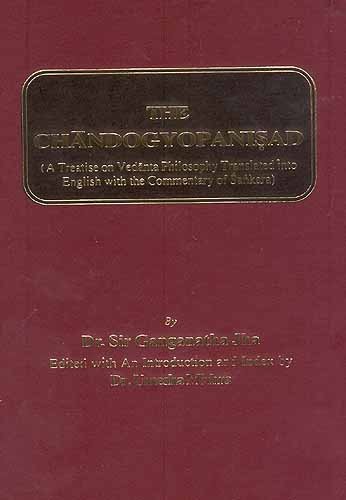Chandogya Upanishad (Shankara Bhashya)
by Ganganatha Jha | 1942 | 149,749 words | ISBN-10: 8170842840 | ISBN-13: 9788170842842
This is the English translation of the Chandogya Upanishad, an ancient philosophical text originally written in Sanksrit and dating to at least the 8th century BCE. Having eight chapters (adhyayas) and many sub-sections (khandas), this text is counted among the largest of it's kind. The Chandogya Upanishad, being connected to the Samaveda, represen...
Section 7.5 (fifth khaṇḍa) (three texts)
Upaniṣad text:
‘Intelligence indeed is greater than Will. When one understands then he wills, then he reflects, then he utters Speech; he utters it in Name; in Name, Mantras become one, and in the Mantras, the (sacrificial) acts.’—(1)
Commentary (Śaṅkara Bhāṣya):
Intelligence indeed is greater than Will;—Intelligence is the faculty of understanding, the faculty of realising things at the proper moment, and the faculty of ascertaining the purpose underlying past and further events;—thus Intelligence is greater than Will—‘How?’ It is when one understands a thing, as ‘this thing happens to be so and so’, that he wills, as to whether it should be given to some one or thrown away;—then he reflects, etc., etc.—as before.—(1)
Upaniṣad text:
‘Indeed all these merge in Intelligence, are made up of Intelligence and abide in Intelligence. Therefore, even if a man knows much, if he be unintelligent, people speak of him as ‘he does not exist, as also what he might know if he were really learned, he would not be so unintelligent. On the other hand, if a man, knowing little, is Intelligent, they listen to him.—Intelligence is the one mergent, Intelligence is the origin and Intelligence is the resting-place.—Meditate upon Intelligence.’—(2)
Commentary (Śaṅkara Bhāṣya):
All these—beginning with Will and ending with the result of Actions,—merge in Intelligence,—they are made up of—have their source in—Intelligence,—and they abide—rest—in Intelligence,—as before. Further, there is further greatness attaching to Intelligence. Inasmuch as Intelligence is the root of Will and the rest,—even if a man knows much,—possessed of much learning of the scriptures, —if he be unintelligent,—devoid of understanding things as they present themselves,—people—wise persons of the world,—speak of him as ‘he does not exist i.e. even though he is present, he is as good as not—present,—‘so also is what—little of the scriptures—he might know whatever he might have learnt is entirely useless—Why?—If he were really learned, he would not be so unintelligent; hence whatever he has learnt is as good as not learnt; such is the meaning.—On the other hand, if a man, knowing little, is intelligent, they listen to him,—wish to have what he has to say regarding the subject at issue.—Hence, it is Intelligence alone which is the mergent etc., of Will and the rest etc., etc.,—as before.—(2)
Upaniṣad text:
‘One who meditates upon Intelligence as Brahman, being himself lasting, well-established and undistressed,—attains lasting, well-established and undistressed regions prepared for him;—and becomes free to act as he wishes in the sphere within reach of Intelligence,—for one who meditates on Intelligence as Brahman.’—‘Revered Sir, is there anything greater than Intelligence?’—‘Certainly, there is something greater than Intelligence.’—‘Explain that to me, Revered Sir.’—(3)
Commentary (Śaṅkara Bhāṣya):
Prepared—fully equipped with all those qualities that are found in intelligent man.—The man who meditates on Intelligence reaches lasting regions etc., etc.—as already explained.—(3)
End of Section (5) of Discourse VII.
